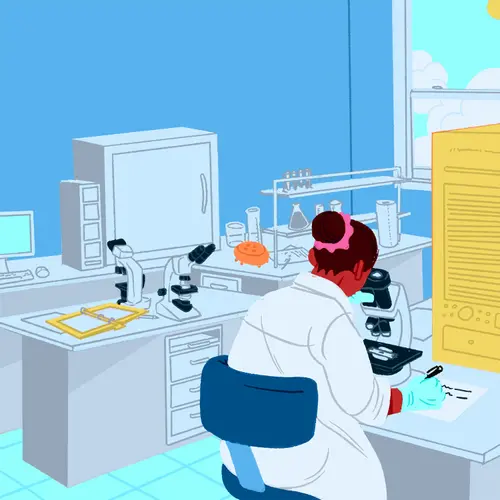Are you trying to have a baby but pregnancy just isn't happening? You may wonder if either you or your partner has a medical problem that needs to be checked out. Take a few minutes to learn what infertility means and what can cause it. Then talk to your doctor to find out what your next steps should be.
Infertility is when you cannot get pregnant after having unprotected, regular sex for six months to one year, depending on your age.
Infertility doesn't always mean you're "sterile" -- unable to have a child ever. Half of couples who get help can eventually have a child, either on their own or with medical help.
Both men and women can have fertility problems. In about 20% of infertile couples, both partners have fertility problems. In about 15% of couples, no cause is found after all tests have been done. This is called unexplained infertility.
The main symptom of infertility is not getting pregnant. You may not have or notice any other symptoms.
Symptoms can also depend on what is causing the infertility. Many health conditions can make it hard to get pregnant. Sometimes no cause is found.
Signs of Potential Infertility in Women
In women, changes in the menstrual cycle and ovulation may be a symptom of a disease related to infertility. Symptoms include:
- Abnormal periods. Bleeding is heavier or lighter than usual.
- Irregular periods. The number of days in between each period varies each month.
- No periods. You have never had a period, or periods suddenly stop.
- Painful periods. Back pain, pelvic pain, and cramping may happen.
Sometimes, female infertility is related to a hormone problem. In this case, symptoms can also include:
- Skin changes, including more acne
- Changes in sex drive and desire
- Dark hair growth on the lips, chest, and chin
- Loss of hair or thinning hair
- Weight gain
Other symptoms of disorders that may lead to infertility include:
- Milky white discharge from nipples unrelated to breastfeeding
- Pain during sex
Many other things can be related to infertility in women, and their symptoms vary.
What Causes Fertility Problems in Women?
The main reason for infertility in women is that you don't ovulate, which means your ovary doesn’t release an egg. A condition called polycystic ovary syndrome is the main cause.
Other issues can affect fertility:
- Problems with your fallopian tubes, which carry eggs from the ovary to the uterus. Sometimes your tubes can get blocked by scar tissue from an infection or from a condition called endometriosis.
- Smoking can lead to fertility problems in women.
- Being overweight or underweight can also play a role.
- If an egg does make its way through your fallopian tubes, many things can stop it from implanting in your uterus.
- Cervical mucus can damage sperm or slow their progress.
In women, fertility drops with age, especially after age 35. Getting pregnant after age 45 is rare.
Signs of Potential Infertility in Men
Infertility symptoms in men can be vague. They may go unnoticed until a man tries to have a baby.
Symptoms depend on what is causing the infertility. They can include:
- Changes in hair growth
- Changes in sexual desire
- Pain, lump, or swelling in the testicles
- Problems with erections and ejaculation
- Small, firm testicles
What Causes Fertility Problems in Men?
The most common cause for infertility in men is a problem with sperm, including:
- Low sperm count, which means you have too few or no sperm in your semen.
- Your sperm don't move as well as they should, which is called low sperm motility.
- You have abnormally formed sperm.
- Your sperm ducts are blocked.
Another common problem is a temporary drop in the amount of sperm you make. This might happen when your testicles get injured. For instance, it could be that your testicles were too hot for too long. Or it might be you were in contact with chemicals or took drugs that affect the way you make sperm.
If you drink alcohol or smoke, your sperm count can go down.
Also, men ages 40 and older have lower fertility.
When Should You See the Doctor?
If you are under 35 and have been trying to get pregnant without success for a year, see your doctor. Women 35 and older should see their doctor after 6 months of trying.
Blood, urine, and imaging tests can be done to discover why you are having trouble getting pregnant. A sperm analysis can be done to check a man's sperm count and the overall health of the sperm.
Your doctor may refer you to a reproductive endocrinologist. That's a doctor who specializes in infertility. You will be asked questions about your infertility symptoms and medical history.
Before you go to the doctor, write down the following information and take it to your next doctor's appointment:
- All the medications you take, including prescriptions, vitamins, minerals, supplements, and any other drugs bought without a prescription
- How often you have unprotected sex, how long you have been trying, and the date of the last time you tried to get pregnant
- Body changes or other symptoms you have noticed
- Dates of any surgeries or treatments in the past, especially those involving the reproductive tract.
- Any radiation or chemotherapy you have had
- How much you smoke, how much alcohol you drink, and any illegal drug use
- Any history of sexually transmitted diseases (STDs)
- Any genetic disorder or chronic illness, such as diabetes or thyroid disease, in you or your family
Listen to your body. Tell your doctor any time you notice a symptom. Early diagnosis of an infertility problem may improve your odds of getting pregnant.

